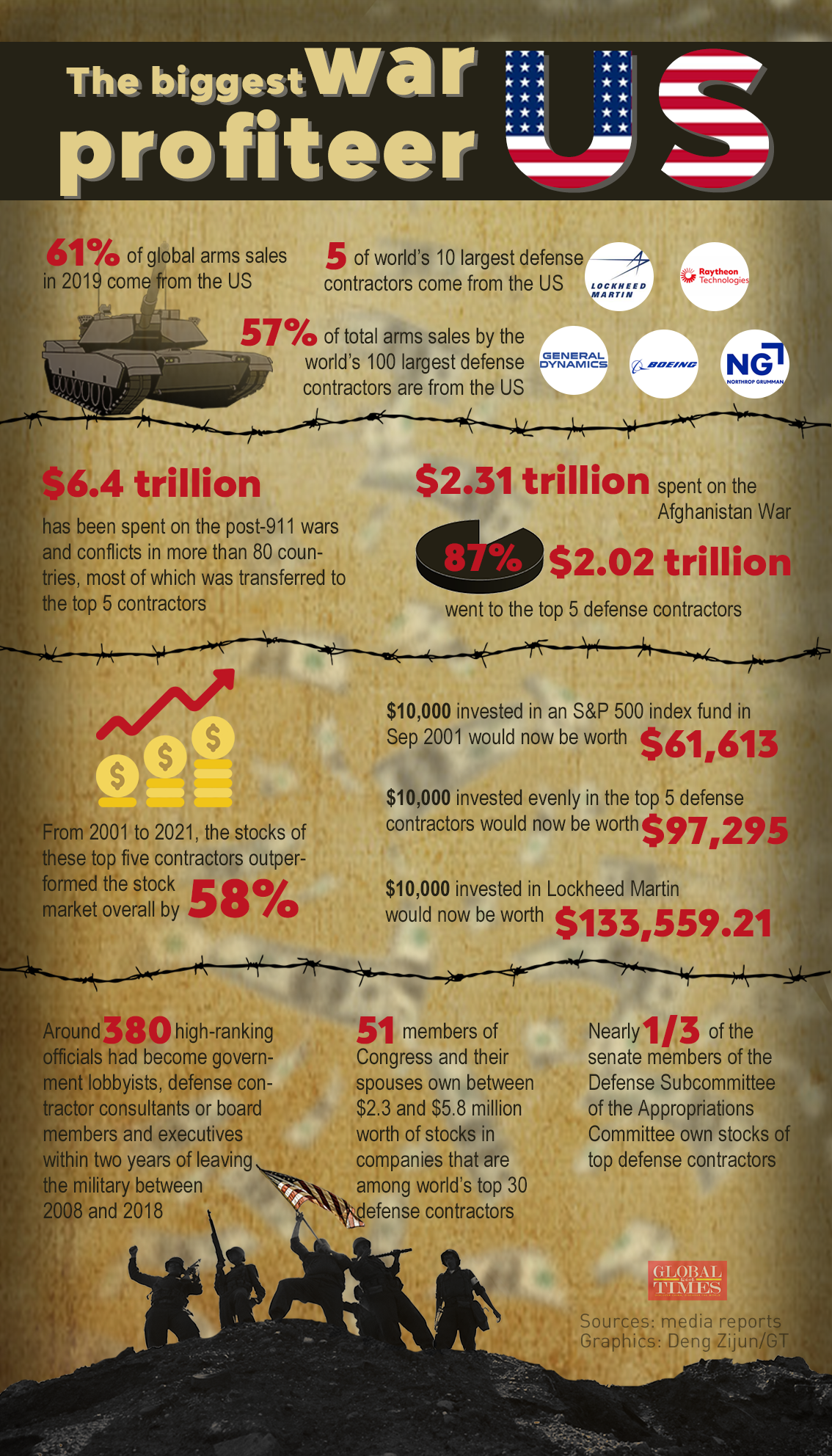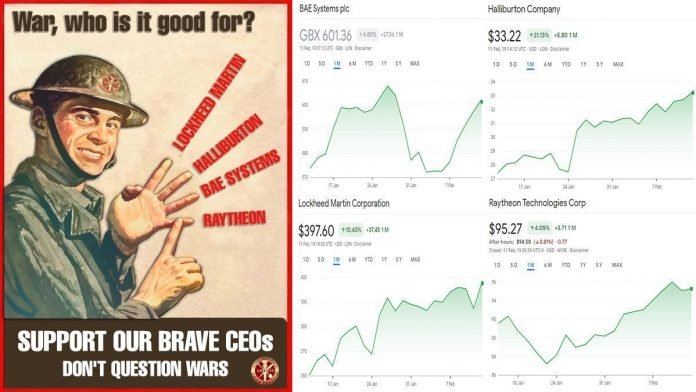Well, if you look at the profit lines of the arms industries, the answer is blatant.
War is unjust, immoral, violent and inflicts suffering on all. For example, the war between Russia and Ukraine is having a pretty bad impact on the global economy, which had only recently begun recovering from the Covid-19 induced massacre. The war is driving up oil and gas prices, while also threatening food security for many nations, especially in the Middle East and North Africa (MENA) region.
But is it all that bad? Is it only gloomy? Is there no silver lining on the horizon? Well of course there is. Just not for ordinary people.
American Senators and members of Congress, for instance, are handsomely profiting out of the catastrophe that has struck Eastern Europe. Separately, defence manufacturers are making a fortune out of the war in Ukraine.
What that means is that while the world suffers, the American military-industrial complex is having the time of its life after a drought of nearly five years.
According to Business Insider, some members of the U.S. Congress stand to personally profit off Russia’s war on Ukraine. At least 18 federal lawmakers or their spouses hold stock in Raytheon Technologies and Lockheed Martin, which manufacture the weapons Western allies are sending Ukraine to fight Russian invaders.
While some lawmakers have long-standing stock and shareholdings in defence manufacturing giants, others acquired them in the weeks preceding Russia’s invasion of Ukraine. Republican Rep. Marjorie Taylor Greene of Georgia, for example, bought between $1,001 and $15,000 in Lockheed Martin shares on February 22 – two days before the invasion. Two days after her purchase, Greene wrote in a Twitter thread: “War is big business to our leaders.”
How Defense Giants are Making a Fortune
There is a reason why so many American lawmakers are rather shameless about having business interests in the defence manufacturing industry. It helps them make big money. In a contest between morals and money, the latter always wins – at least for the American lawmakers.
As of March 10, Lockheed and Raytheon shares are up by around 16% and 3% respectively since the invasion. BAE Systems, the largest player in the UK and Europe, was up 26%. This war came as a blessing for America’s cash-strapped deep state.
Investors by March had posted $48.6 billion in stock gains on the 32 major defense and aerospace stocks.
War in Ukraine: Which companies are profiting?
Business is booming for arms makers, and energy companies – due to the war in Ukraine. Many European and American companies are benefiting from the crisis.
NATO countries have been sending Ukraine military equipment worth more than $8bn (£6.4bn), while European countries have pledged to spend an extra €200bn (£170bn) on defence in the coming years.
Which companies will make the most money?
One of the biggest winners apart from the obvious is the U.S. LNG exporters, who have emerge as big winners of Europe energy crisis.
Emerging as big winners of Europe’s supply crisis as they export record volumes to the European Union for the third consecutive month at prices that have rallied since Russia’s invasion of Ukraine.
European gas prices have hit all-time highs just as exporters of LNG in the United States completed projects that had been under development for years to deliver abundant shale gas supplies to international markets.
Andrew Goldman, the co-founder of Western LNG and a former Joe Biden adviser must be raking it in.
Biden’s ties to Goldman bring into focus his significant connections to the much larger liquefied natural gas firm Cheniere Energy. Goldman’s fellow Western LNG co-founder, CEO Davis Thames, was previously senior vice president and chief financial officer of Cheniere Energy, a company that paid Biden’s current climate adviser more than a million dollars to serve on its board until 2018. And a former Biden adviser lobbied for the company.
.@Eyesgack of @sunrisemvmtChi asks: How can we expect @JoeBiden to hold fossil fuel executives accountable when he’s going to a fundraiser hosted by one tomorrow?
— Sunrise Movement 🌅 (@sunrisemvmt) September 5, 2019
If the climate crisis is serious to Joe, he should stop holding fundraisers w/ oil profiteers #NoFossilFuelMoney pic.twitter.com/Rfq0u3NITj
US defence contractors are amongst biggest beneficiaries.
Washington is sending 6,500 Javelin anti-tank missile systems, which are made by Raytheon and Lockheed Martin. The cost of each missile is about $78,000 (£66,000) and the reusable launcher is another $100,000 (£85,000). Ukraine will receive more of the systems from France and Estonia, with the UK government saying it is spending £1.3bn ($1.6bn) on military support for Ukraine.
The U.S. is spending $54 Billion on Ukraine
The bulk of the aid is allocated through traditional foreign aid channels. That includes money to provide urgent support, health services and food assistance to Ukrainian refugees inside and outside Ukraine. The latest bill, which had been delayed for a week by the objection of Senator Rand Paul of Kentucky, includes money for logistical support and training for the Ukrainian military and national security forces, and for a fund intended to secure the continuity of Ukraine’s government.
Forty percent of the aid has been directed to weapons transfers, to provide medical and intelligence support to allied countries in Europe, and to deploy troops there.
President Biden authorised the transfer of an additional $11 billion in American weapons, equipment and defence supplies to Ukraine, and allocates $9.1 billion to replenish that stockpile.
If we can find the money to kill people, we can find the money to help people.
TONY BENN
Of course, the US has been supplying arms since 2014.
The Global Security Contingency Fund, a joint program of the U.S. Departments of State and Defense, has provided more than $42 million in training, advisory services, and equipment to the Government of Ukraine even before the invasion by Russia. They say to further develop the tactical, operational, and institutional capacities of its Special Operations Forces, National Guard, conventional forces, non-commissioned officer corps, and combat medical care
However, corporations don’t need actual war to make profits. The mere ‘Rumour of War’ is enough to empty treasuries of public money, money best spent feeding the people not scaring them into submission and the invention of yet another threat to their liberties.
Keeping people in fear is the best way they can control us.
On Jan. 17, 1961, President Dwight Eisenhower gave the American nation a dire warning about what he described as a threat to democratic government. He called it the military-industrial complex, a formidable union of defence contractors and the armed forces.
Military-Industrial Complex is an unofficial phrase used to signify the rather ‘comfortable’ relationship that can develop between government entities (namely defence) and defence-minded manufacturers/organisations. This union can produce obvious benefits for both sides – war planners receiving the tools necessary for waging war (while also furthering political interests abroad) while defence companies become the recipients of lucrative multi-million or multi-billion dollar deals.
‘War for profit’ is not an exclusive approach for modern times as it drove the best and worst of old Europe for many decades – perhaps best exemplified by the naval arms race seen between France, Spain and Britain. The driving force behind these initiatives was generally in out-doing a potential foe and, therefore, forcing the establishment of a large standing military force to counter the moves of the potential enemy.
The modern interpretation of this, as it relates to the Military-Industrial Complex, is only slightly altered in that the established military force is now utilised to further global interests – the enemy is no longer another nation per se but any organisation not in line with presented ideas.
At any rate, the theory of a mutually beneficial relationship existing between war planners and industry is not unfounded for there is much money to be made in the design and development process of military goods which precede lucrative production commitments. As such, a defence contractor can be the recipient of multiple contracts during the lifespan of a single product leading many of the top firms to find ways to consistently outdo competitors in an attempt to maintain their own respective bottom lines in the boardroom and appease shareholders.
Eisenhower warning.
Eisenhower cited the ‘Military-Industrial Complex’ as a grave warning to the American people based on his experiences of an unlimited wartime economy coupled with a political environment as witnessed during, and after, World War 2 (1939-1945) – the warning being, to not let the military-industrial establishment dictate America’s actions at home or abroad for such unchecked power would begin to usurp the inherent freedoms found in the very fabric of democracy.
SUPPORT OUR BRAVE CEOs DON’T QUESTION WARS
Of course, the Industrial arms complex is now global, its influence dictating decisions made in governments around the world. Threats of war, even rumours of war can send their relative corporations shares rocketing in a very literal sense creating billions in profit without even a shot fired.
The withdrawal of the US military from war-torn Afghanistan has been widely seen as a failure in politics. However, analysts pointed out that the 20-year war means rather an “extraordinary success” for the American Military-Industrial Complex (AMIC) composed of private arms dealers, lobbyists and Pentagon’s officials who perpetuated war and got immense profits from the attacks.
The American independent think tank Security Policy Reform Institute (SPRI) recently released a list of the top beneficiaries from the Afghanistan War, which includes well-known US military contractors like Lockheed Martin, Raytheon, General Dynamics, Boeing and Northrop Grumman.
Experts pointed out that from Iraq to Syria and Afghanistan, the US’ military-industrial complex, fueled by huge economic lure, has created an enemy target: terrorists.
This reminds of the US former President Dwight Eisenhower’s warning in early 1961 that “an immense military establishment and a large arms industry” had emerged as a hidden hand in US politics.
Analysts say that the essence of AMIC’s system is relying on an axis of influence of private dealers, lobbyists and defence officials that developed a self-sustaining and recycling attack-driven industry.
Black money behind war: How the US military-industrial complex has thrived after attacks in Middle EastBy Hu Yuwei and Lu Yameng Published: Sep 09, The biggest war profiteer—US. Graphic: Deng Zijun/GTThe biggest war profiteer—US. Graphic: Deng Zijun/GT
Eisenhower, a retired five-star Army general, the man who led the allies on D-Day, made the remarks in his farewell speech from the White House.
Eisenhower used the speech to warn about “the immense military establishment” that had joined with “a large arms industry.”
Eisenhower coined the phrase “The Military Industrial Complex” when warning of a close relationship between the government and its defence industry.
“In the councils of government, we must guard against the acquisition of unwarranted influence, whether sought or unsought, by the military-industrial complex. The potential for the disastrous rise of misplaced power exists, and will persist.”
Since then, the phrase has become a rallying cry for opponents of military expansion.
Eisenhower gave the address after completing two terms in office; it was just days before the new president, John F. Kennedy, would be sworn in.
Eisenhower was worried about the costs of an arms race with the Soviet Union, and the resources it would take from other areas — such as building hospitals and schools.
Eisenhower’s “Military-Industrial Complex” Speech Origins and Significance, in full.
Bowman says that in the speech, Eisenhower also spoke as someone who had seen the horror and lingering sadness of war, saying that “we must learn how to compose differences not with arms, but with intellect and decent purpose.”
Another concern, Bowman says, was the possibility that as the military and the arms industry gained power, they would be a threat to democracy, with civilians losing control of the military-industrial complex.
In his remarks, Eisenhower also explained how the situation had developed:
“Until the latest of our world conflicts, the United States had no armaments industry. American makers of ploughshares could, with time and as required, make swords as well. But we can no longer risk emergency improvisation of national defence; we have been compelled to create a permanent armaments industry of vast proportions.”
The difference, Bowman says, is that before the late 1950s, companies such as Ford built everything from jeeps to bombers — then went back to building cars. But that changed after the Korean War.
Bowman says that it’s important to note that during the Cold War, the U.S. military didn’t draw down its troops like it did after World War II.
“It kept a large standing army after the Korean War,” he says.
America’s new reliance on sophisticated weapons technology also helped bring about what Bowman calls “a technology race with the Soviets.”
And that meant that weapons manufacturing became more specialised.
“So [for] a company like Ford, going from cars to jeeps is one thing; cars to missiles is quite another,” Bowman says.
In an effort to control the expansion of the military-industrial complex, Eisenhower consistently sought to cut the Pentagon’s budget.
The former general wanted a budget the country could afford, Bowman says. He upset all the military services with his budget cuts, especially the Air Force.
Citing another quote from Eisenhower — this one from another speech on military spending — Bowman says, “The jet plane that roars overhead costs three quarters of a million dollars. That’s more than a man will make in his lifetime. What world can afford this kind of thing for long?”
You can find more on the Industrial arms complex here
Support Independent Journalism Today
Our unwavering dedication is to provide you with unbiased news, diverse perspectives, and insightful opinions. We're on a mission to ensure that those in positions of power are held accountable for their actions, but we can't do it alone. Labour Heartlands is primarily funded by me, Paul Knaggs, and by the generous contributions of readers like you. Your donations keep us going and help us uphold the principles of independent journalism. Join us in our quest for truth, transparency, and accountability – donate today and be a part of our mission!
Like everyone else, we're facing challenges, and we need your help to stay online and continue providing crucial journalism. Every contribution, no matter how small, goes a long way in helping us thrive. By becoming one of our donors, you become a vital part of our mission to uncover the truth and uphold the values of democracy.
While we maintain our independence from political affiliations, we stand united against corruption, injustice, and the erosion of free speech, truth, and democracy. We believe in the power of accurate information in a democracy, and we consider facts non-negotiable.
Your support, no matter the amount, can make a significant impact. Together, we can make a difference and continue our journey toward a more informed and just society.
Thank you for supporting Labour Heartlands












